Interview
‘Why my Ukrainian Christmas food traditions bring extra meaning this year’
22 Dec 2022
8m
In February, two days after Russia invaded Ukraine, Nadiyka Gerbish, her daughter and their dog fled to neighbouring Poland.
She stayed in a cottage with a group of other Ukrainian refugees whilst her husband remained in their hometown of Ternopil. Like many families, they had to grapple with being suddenly separated, unsettled and undoubtedly terrified about the future.
“The separation was very difficult and emotionally straining,” Nadiyka says, in an exclusive interview with Twisted. “It was not easy at all, but he had to stay due to martial law, and also even without that, really. He had to stay in case he was needed here in Ukraine”.
Unhappy without her husband and away from the place she calls home, Nadiyka – who is an acclaimed author and podcaster – decided to bring her family back to Western Ukraine three months later.
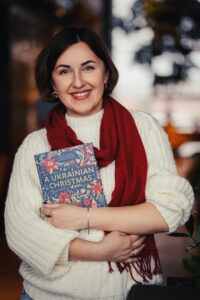
Nadiyka spoke to Twisted about traditional Ukrainian Christmas food (Credit: Nadiyka Gerbish)
It was, she explains, a brutal choice between two less than desirable ways of living. She has resided in a world of blackouts, air raid sirens and uncertainty ever since.
Nadiyka’s story is one that many across Ukraine can resonate with. Others have been completely displaced, have seen their hometowns destroyed and have even lost loved ones. It’s for this reason she says the holiday period is going to hold extra meaning for many this year.
“Putin took a lot from us, but he can’t steal Christmas,” she says. “He can’t steal joy and community and family.”
Diving into the deep-rooted symbolism behind nativities, carols and the traditional Ukrainian Christmas food that is eaten (and avoided) over the holiday period, Nadiyka’s new book A Ukrainian Christmas, poignantly highlights how maintaining these practices is a way of “gaining victory during the war.”
We speak to her about some of these food traditions below…
Ukrainian Christmas Traditions
For many, Christmas has become about abundance and excess, but in Ukraine, it’s about restraint.
Those belonging to Ukrainian Orthodox and Greek-Catholic churches take part in a tradition known as Pylypivka, which is a fast that goes on for forty days in the run-up to Christmas.
During the fast, those observing it don’t cut out food completely, but Ukrainian Christmas traditions dictate that they avoid most animal products like meat and dairy, and have a diet of vegetables, porridge, beans and some fish.
“[These days, whether you do] observe a vegan diet or not is up to you, but what’s very important is that during this time you remember to sacrifice something for the sake of your community,” Nadiyka says. “There’s an idea that during the fast, you should say no to something that takes a lot of your attention and time, and is valuable for you.
“Before the war, people had plenty of food and it wasn’t as valuable to them. So, we were told that we could instead sacrifice our time – for example, meeting with your friends more, helping the community and sacrificing your time on social media just to see people face to face.”
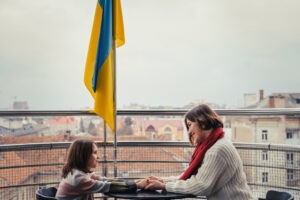
Nadiyka and her daughter in Ukraine (Credit: Nadiyka Gerbish)
Nadiyka still chooses to fast, “because I need to keep the whole perimeter of my country in my head.”
This year more than ever, she explains: “It’s not only about the religious part of it. I need to think about the people in the occupied territories who do not have meat or sweets or chocolate. It’s very important for me just to remind myself.
“But really, [the tradition is about saying] ‘I will omit this, but I will do something else instead’, and the ‘instead’ part is the most important.”
For Nadiyka and her family, this has taken the form of helping fellow Ukrainians that need it, and welcoming them into their community and homes.
“Our region was hit several times, but never our town so far, and I hope it will stay this way,” she says. “We’ve been helping internally displaced people, bringing them food, and now I’d call them friends…some of them are even coming to my birthday this year.
“They’re so resilient and so strong. We learn a lot from them. So, yeah, the fasting has always been a very special part of Christmas, but [against the backdrop of war] it is even more meaningful now.”
The fast culminates on Christmas Eve, which is when observing Ukrainians have what is called a Holy Supper.
“This is my favourite evening of the year. It has such warmth and it’s when the whole family gathers together,” Nadiyka says. “If someone has relatives in the countryside, everybody will go there and carollers will come and sing while you’re eating.
“We [also] share memories of the past year with each other, as well as our hopes for future years. [Of course, the meal] will have a trace of bitterness this year, not only because of the deceased relatives, but also because of the men who are away from their families and on the front lines, who will not be able to spend Christmas at home.
“It will be very, very sad for most of us, but as I said, we must carry on.”
Ukrainian Christmas Food
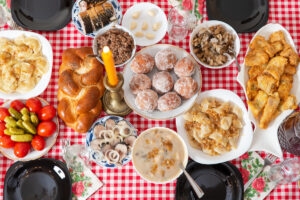
A Ukrainian Christmas dinner table (Credit: Alamy)
One of the many ways people do that is through food and culinary traditions.
For one, all Ukrainian households prepare 12 plant and grain based dishes, which include kutia (a porridge made from unground wheat), borsch (a soup), varenyky (cabbage dumplings), holubtsi (cabbage rolls) and pickled herring, as well as Ukrainian kolach bread and several other favourites.
The 12 dishes are meant to represent Jesus’ disciples, but of course, over the years, each recipe has also come to symbolise so much more. For one, given that Ukraine is 600,000 square km, they act as somewhat of a family crest, highlighting the diversity of the people within the country, with individual intricacies that are passed down the generations.
“Senior ladies are always in charge of preparing the food,” Nadiyka says. “And even if you’re a better cook, which I’m not of course, you would still give that opportunity to them to guide the whole process. It’s a time where they get the authority.
“Almost all of my recipes come from [my grandmother and my mother in law], and I will pass it on as a legacy.”
The most obvious example of Ukrainian Christmas food holding a legacy is borsch – a soup which “every Ukrainian household has their own way of preparing.”
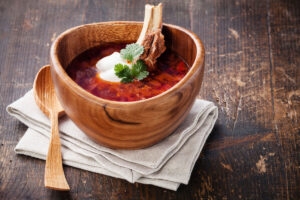
Borsch has loads of different varieties (Credit: Alamy)
“In my family, we use beetroot and tomatoes, but for example, in eastern Ukraine they sometimes use a different kind of beetroot or do not use beet at all, only adding peppers and tomatoes,” Nadiyka says. “Some people add dumplings to the borsch, and I just visited Poltava where they add dried pears, which is delicious!
“So, there are so many variations, and they [tell a story of] the people of Ukraine. Ukraine is huge and it has so many regions with different cultures. We have lots of different ways of cooking traditional dishes, but they’re ours and it brings about inclusivity.”
Another dish that varies from household to household is kutia – a wheat pudding, which sees a whole variety of different rices and seasonings added wherever you go.
“When you know the recipe, you know the region,” Nadiyka says. “But not only that, in western Ukraine, if you come from a wealthy family, your kutia is not watery, and if you come from a poorer family – not in this generation, but several generations before us – they traditionally make watery kutia, because they once didn’t have enough for the whole family so they added more water.
“So, you know the history of a family [through their Christmas dinner table].”
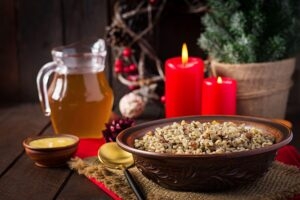
Kutia is a Ukrainian Christmas staple (Credit: Alamy)
Not only does the traditional Ukrainian Christmas dinner offer a window into the lives of those cooking it, but the way the dishes are prepared is often steeped in tradition, too.
“To make kutia you have to crush poppy seeds, and my family have an ancient dish which was handmade and hand painted, and also a wooden vessel called a makohin which we use to crush them,” Nadiyka says, to give just one example.
“It’s a great tradition because due to the wars – it’s not the first war in Ukraine – most families do not have many heirlooms, so if you have an old dish from your grandmother or her grandmother, you are very lucky.”
What’s more, the ingredients in specific dishes also hold a special significance. In particular, the grains and wheat (found in kutia, kolach, dumpling dough and plenty more of the festive baked goods).
“Every Ukrainian knows about Holodomor,” she says. “It was an artificial famine [in 1932 and 1933] created by the Soviets in Ukraine [which affected wheat supply], and caused millions of people to die.”
As a result of this, grains went on to hold huge symbolism to Ukrainian people. Cooking with them was about ownership, it was about reclaiming their land and celebrating their sustenance.

The food traditions are passed down the generations (Credit: Nadiyka Gerbish)
This has only been affirmed in the last year, as the start of the war saw Russia stealing Ukrainian grain and burning Ukrainian fields, she explains.
“When I was young, we had a tradition passed down from previous generations that said if a piece of bread fell down, we had to pick it up and kiss it just to show respect,” she says. “Especially this year, we’ll speak to our children and discuss this between ourselves.”
It’s clear there’s meaning behind pretty much every traditional Ukrainian Christmas food, all of which will be especially prominent this year. Some Ukrainians put a coin in one of their varenyky dumplings to betroth prosperity and wellbeing upon the lucky recipient, and cabbage holubtsi have a name deriving from dove (holub), symbolising peace and serenity.
However, the most poignant Ukrainian Christmas dinner tradition comes not from dishes or the way they’re prepared, but from an extra chair which is always left empty when families gather.
“It’s an Orthodox tradition, used to observe the memory of a deceased relative,” Nadiyka explains. “I’m from a protestant background and we also see it as a seat for a stranger. So, if somebody comes, we will offer him or her that chair.”
Of course, this year, the empty chair is even more symbolic to Ukrainians, whatever their background.
As well as symbolising Nadyika’s own spirit of generosity and community, “it shows an understanding that not every loved one is with us, but that there’s hope for their return,” she adds. “This hope helps us to survive, and keep going through this winter.”
You can order A Ukrainian Christmas by Nadiyka Gerbish and Yaroslav Hrytsak here. Follow Nadiyka on social media here, and to donate to the British Red Cross’ Ukraine Crisis Appeal click here.

.jpg_RVG9qi?tr=w-2560,f-webp,q-70)
.png_2XIXGj?tr=w-2560,f-webp,q-70)
.jpg_qa3BF9?tr=w-2560,f-webp,q-70)